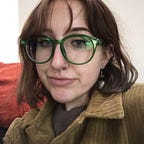Changing My Use of Technology
I have many concerns about my technology use and it has not been until this week that I have really come to terms with the fact that I am addicted to technology, especially since the beginning of the pandemic. I was introduced to technology very young, and while the devices have changed, my use only increases with the passing years. After reading It’s Time for a Digital Detox by Brian Chen, I felt seen and understood that someone else could relate to being on their phone for 7 hours a day. This of course is in stark contrast to my use before the pandemic. With online classes, I cannot help but to be online all day everyday. When I worked, we had a tablet — even then, I could not escape technology. Recently, being stuck in a mental health rut, my screen-time has gone even farther up, as I have been playing Netflix for background noise while I sob and stress. Then, go to my phone for distraction.
I have definitely found myself to be overly connected online. I can go through video spirals where I will watch an extremely concerning amount of either True Crime or videos about space on YouTube. While I always have my phone, I will often go long periods without answering text messages — not because I do not want to, but because I feel a sense of anxiety talking to other individuals, as if I am boring. Yet, I will be engaged with the app Candy Crush for hours on end because I do not have to think. I go to my phone for comfort and distraction, for some reason unable to create those things outside of technology. The Psychology of Building Addictive Products by Silvia Sam highlights this contradiction, where apps often create a sense of anxiety, yet also satisfy it.
I would benefit from a digital detox, however it is not possible for me now. Yet, there are actions that I do want to implement. Brian Chen further explains actions that can be taken in his previously mentioned article. Making modest goals is one of these. I need to quit looking at a screen before I go to sleep. Replacing the last hour before bed with a book instead of screen time is quite plausible for me. Recently, I discovered that you can put screen time limits for certain apps on the iPhone. I need screen time limits for YouTube and recently, Candy Crush. Limiting YouTube to an hour and a half a day and Candy Crush to a half hour would be sufficient. To decrease negative distraction, I should replace it with somewhat positive distraction. With embroidery supplies, art supplies galore, and a plethora of books, I still find myself going to my phone. However, I have a bracelet that I have been meaning to finish, so until it is finished I want to pour my energy into this, rather than waste away on my phone.
Besides this, I want to turn off notifications for many of my apps on my phone. I turned off Instagram notifications a few years ago and I engaged with it alot less frequently. For some reason I just have not had the capacity to go back and fix it for other apps I have. In particular, I get many notifications from two astrology apps that will often cause me to look at my phone screen for no reason, playing “will I get distracted?” roulette. This goes for other applications as well. I see no point in having notifications that are not important to me because I will end up mindlessly scrolling notifications or not. However, less frequently would be preferred. Overall, I plan to implement these actions (I am turning off non-important notifications right now) in order to hopefully reduce my screen and information in-take.
References:
Chen, B. X. (2020, November 25). It’s Time for a Digital Detox. (You Know You Need It.). Retrieved December 13, 2020, from https://www.nytimes.com/2020/11/25/technology/personaltech/digital-detox.html
Sam, S. L. (2016, August 16). Nir Eyal: The Psychology of Building Addictive Products. Retrieved December 14, 2020, from https://medium.com/startup-grind/nir-eyal-why-you-are-addicted-to-facebook-slack-pinterest-468a86eb562
